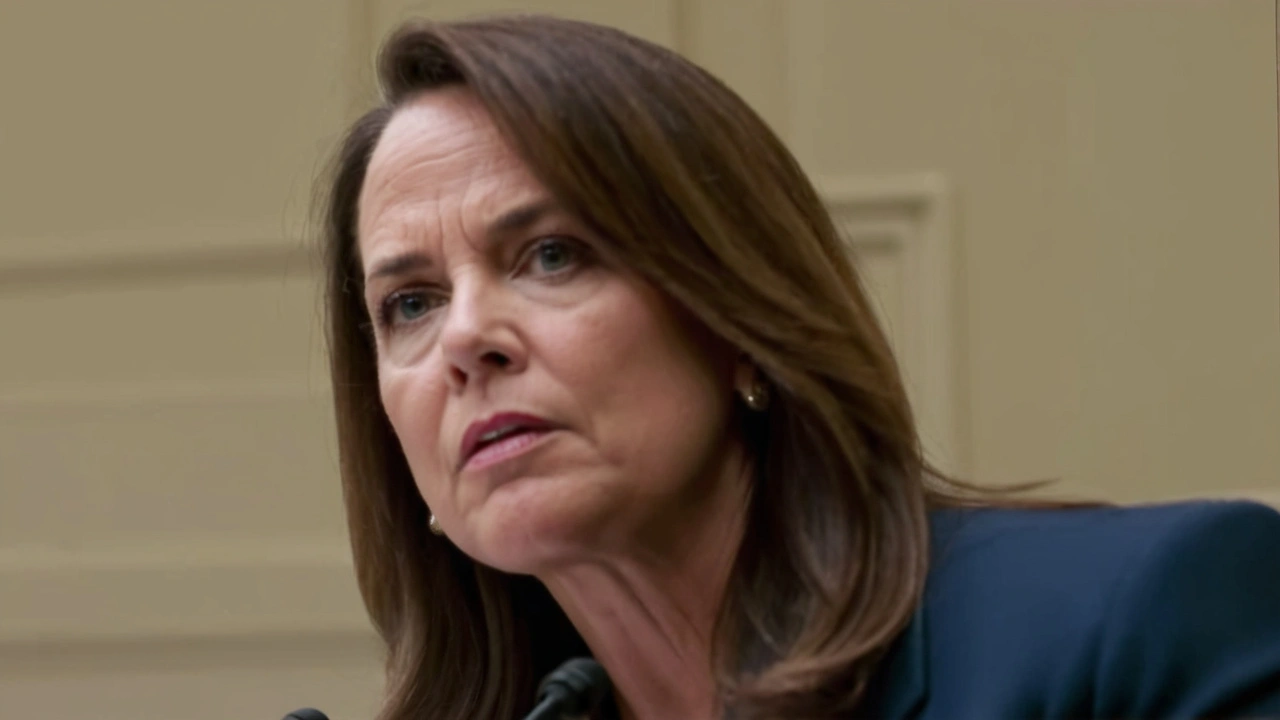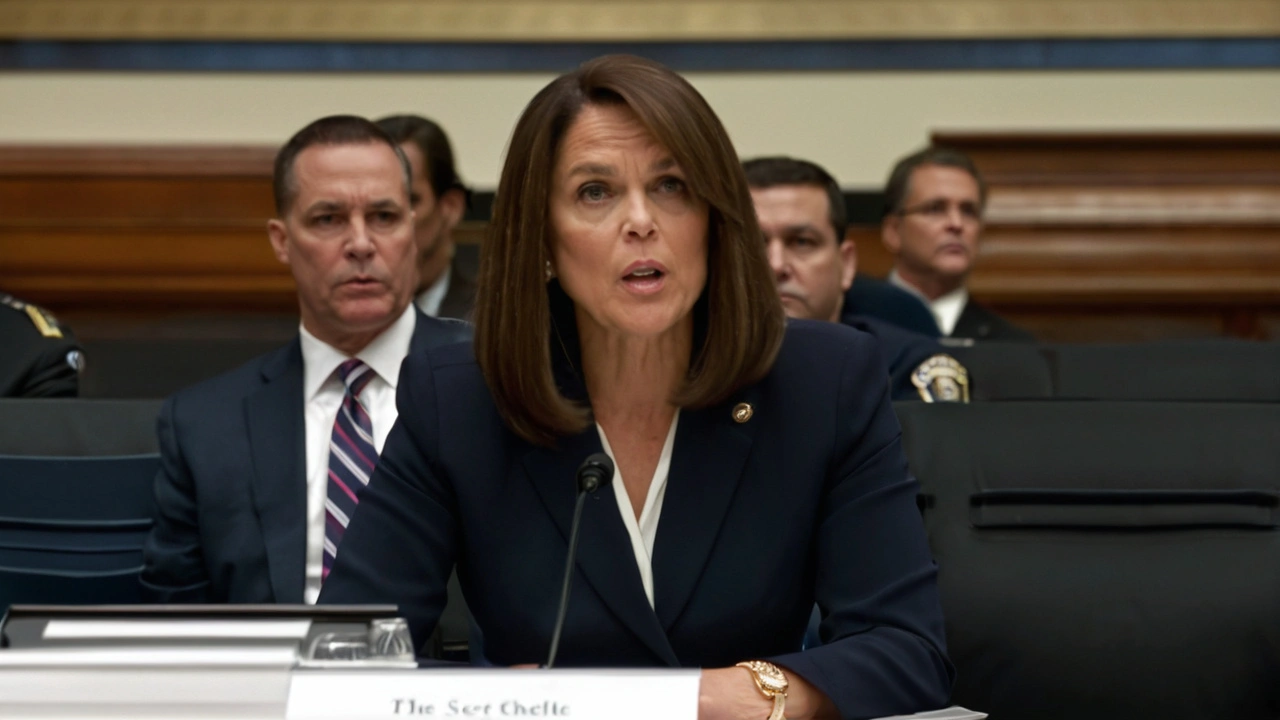The corridors of power were rife with tension as Kimberly Cheatle, Director of the United States Secret Service, took to the stand before the House Oversight Committee. The committee, composed of both Republican and Democratic lawmakers, sought to get answers regarding the recent assassination attempt on former President Donald Trump. The incident, which took place on July 13, has not only cast a shadow over the agency but has also raised serious questions about the security measures protecting former and current leaders.
Cheatle began her testimony by acknowledging the severity of the situation. 'The Secret Service's mission is to protect our leaders. On July 13, we failed,' she stated unequivocally. These words, though honest, were cold comfort to the committee members who demanded explanations for the glaring security lapses that allowed the attempt on Trump’s life.
Throughout the hearing, Cheatle was bombarded with questions about the agency's preparedness and past responses to threats against the lives of key political figures. Lawmakers were particularly incensed by the reported denial of additional resources to Trump's security team, a decision that may have left him vulnerable to attack. Cheatle's often vague responses further fueled the frustration of committee members already at their wits' end over what they perceive as a lack of transparency.
Representative James Comer, the committee chairman, expressed exasperation over Cheatle’s inability or unwillingness to divulge specific details, ostensibly due to the ongoing investigation. 'The American people deserve to know how their leaders are being protected and why such a significant failure occurred,' Comer said pointedly.
Both sides of the aisle found common ground in their criticism of the Secret Service. Lawmakers called the recent failure not just a one-off mistake but an institutional issue requiring comprehensive reforms. Representative Carolyn Maloney emphasized the need for transforming how the agency operates. 'This cannot happen again. We need a full-scale overhaul of the agency’s security protocols,' she asserted.
Aside from direct questions about the incident, Cheatle also faced scrutiny regarding the broader issues plaguing the agency. Over the years, the Secret Service has been criticized for various lapses, from scandals involving agents to failures in protecting key individuals. Lawmakers questioned whether the agency had become complacent, and whether its current leadership was capable of ushering in the necessary reforms.
The incident also led to calls for Cheatle's resignation from a segment of lawmakers who believe that real change can only begin at the top. They argued that the search for new leadership would inject fresh perspectives and modernize an agency viewed in some quarters as outdated and unresponsive.
Committee's Frustrations
The House Oversight Committee's session was a tumultuous one, marked by sharp exchanges and intense questioning. Cheatle’s reluctance to divulge certain details, given the 'ongoing investigation,' did little to engender trust among the committee members. Representative Ro Khanna was particularly vocal, asserting that the public’s right to information should not be curtailed by procedural technicalities. 'Hiding behind an ongoing investigation is not acceptable. Accountability must be immediate,' he declared.
This clash highlights a broader issue of transparency and accountability within federal agencies, a problem that transcends the Secret Service. The Committee’s frustrations reflect a growing sentiment that public institutions are failing to be as transparent and accountable as they need to be, especially when national security is at stake.

Internal and Independent Reviews
In response to the committee’s concerns and the widespread public outcry, Homeland Security Secretary Alejandro Mayorkas announced an independent review of the Secret Service’s protocols and procedures. This independent review aims to identify not only what went wrong on July 13 but to make comprehensive recommendations on preventing similar lapses in the future.
Mayorkas assured that the review would be exhaustive and that its findings would be made public to ensure transparency. 'We owe it to the American people to leave no stone unturned in understanding and rectifying this egregious error,' he said.
The review, which will be conducted by an external body, is designed to complement internal investigations already underway within the Secret Service. The hope is that this dual approach will provide a fuller picture and lead to more robust reforms.
Historical Precedents and Patterns
This isn’t the first time the Secret Service has come under fire for security failures. Historical patterns indicate that significant lapses often lead to calls for major overhauls, but systemic change has been elusive. For example, the assassination attempt on Ronald Reagan in 1981 led to some reforms, but many argue that those changes were not far-reaching enough.
Similarly, other high-profile security breaches, including the infamous White House gate-crashing incident in 2009, have sporadically illuminated the flaws within the agency. Despite sporadic revisions and the introduction of new protocols, the Secret Service has continually found itself battling the same underlying issues of resource allocation, training, and internal accountability.
The assassination attempt on Trump may serve as another critical juncture, potentially prompting the most extensive set of reforms in the agency’s modern history. Lawmakers and the public alike are hopeful but skeptical about the likelihood of enduring change.

Public and Political Reactions
The news of the assassination attempt and the resulting fallout has elicited a variety of reactions from the public and political figures. Supporters of Trump have been quick to criticize the Secret Service and call for greater vigilance and accountability. Some have pointed to what they perceive as a politically motivated neglect in the agency's duties.
Conversely, political opponents of Trump have largely focused on the need for systemic reform within the Secret Service, emphasizing that the agency’s mission transcends individual political identities.
Public opinion is sharply divided, as is often the case in modern American politics. The trust that citizens place in their protective agencies is at stake, and the leadership of these agencies must work to restore that trust through concrete actions, rather than assurances alone.
In closing, Cheatle's testimony before the House Oversight Committee is only the beginning of what promises to be an exhaustive review process, filled with scrutiny and calls for change. The committee’s bipartisan frustration underscores the critical nature of the issue at hand. As the independent review progresses and additional details come to light, the American people are watching closely, eager to see whether this incident will be a catalyst for meaningful reforms or just another chapter in a recurring saga of institutional inertia.


Comments
Pauline Herrin
It is evident that the oversight exhibited during the July 13 incident reflects a systemic failure rather than an isolated error. The Secret Service’s protocols apparently lacked the rigor expected of a federal protective agency. Moreover, the inability to allocate additional resources to Mr. Trump’s security detail is indefensible. Such shortcomings demand comprehensive reforms and heightened accountability.
July 23, 2024 at 19:48
pradeep kumar
I feel sick just thinking about how the agency messed up on that day. Their negligence is a disgrace and they should be held fully responsible.
July 28, 2024 at 09:31
love monster
The failure on July 13 underscores multiple layers of operational breakdown within the Secret Service. First, the risk assessment matrix apparently did not flag the elevated threat level for a former president with a volatile political profile. Second, the allocation of protective details was clearly misaligned with the intelligence inputs, indicating a gap in threat‑to‑resource mapping. Third, standard operating procedures (SOPs) for convoy security appear outdated, lacking modern counter‑surveillance technologies such as encrypted telemetry and real‑time geofencing. Fourth, the training regimen for agents does not seem to incorporate scenario‑based drills that simulate insider threats and coordinated attacks. Fifth, there is an apparent deficiency in inter‑agency communication protocols, as information from the FBI and DHS was not seamlessly integrated into the Secret Service’s operational picture. Sixth, the command‑and‑control hierarchy during the event was ambiguous, leading to delayed decision‑making on the ground. Seventh, resource constraints, whether real or perceived, have evidently been prioritized over mission-critical needs. Eighth, the post‑incident debrief appears to have been shallow, focusing on superficial blame rather than root‑cause analysis. Ninth, the oversight mechanisms within the Department of Homeland Security have not enforced rigorous compliance audits. Tenth, the culture of complacency, as suggested by recurring lapses across decades, must be addressed through leadership change. Eleventh, the procurement process for advanced protective equipment is sluggish, preventing timely upgrades. Twelfth, the agency’s internal whistleblower channels may be underutilized, discouraging agents from reporting systemic flaws. Thirteenth, public transparency is lacking, eroding confidence in the agency’s ability to safeguard leaders. Fourteenth, political pressures should never compromise the impartial execution of security duties. Fifteenth, a holistic overhaul, anchored by an independent review, is essential to restore the Secret Service’s credibility and effectiveness.
August 1, 2024 at 23:15
Christian Barthelt
While the previous comment raises many points, it is worth noting that several of the claims are phrased without proper citation. For instance, the assertion that “risk assessment matrix didn’t flag the threat” lacks specific evidence. Additionally, the use of the term “complacency culture” should be qualified rather than presented as an absolute. Precision in language is crucial when evaluating institutional performance.
August 6, 2024 at 12:58
Ify Okocha
Honestly the idea that the Secret Service is merely “lacking training” oversimplifies a complex institutional problem. The agency has faced budgetary constraints and bureaucratic inertia for years, which cannot be brushed aside as a simple training deficit. Moreover, blaming “political pressure” ignores the fact that many of these security lapses predate current administrations.
August 11, 2024 at 02:41
William Anderson
What a spectacular display of incompetence-another chapter in a never‑ending saga of bureaucratic blunders. The agency’s own reports admit to outdated procedures, yet there is no decisive action. It’s a disgraceful pattern that keeps repeating.
August 15, 2024 at 16:25
Sherri Gassaway
One might contemplate whether the very notion of security is not a fixed construct but a fluid dialogue between threat and safeguard. If the Secret Service remains static, perhaps it becomes the very obstacle to its own purpose, a paradox of protection turned into vulnerability.
August 20, 2024 at 06:08
Milo Cado
Great analysis! 🌟 It’s clear that a comprehensive overhaul is overdue, and I’m hopeful the independent review will bring the necessary changes. Let’s keep the conversation constructive and supportive. 🙏
August 24, 2024 at 19:51
MONA RAMIDI
This is exactly why I’m fed up with half‑hearted apologies. The agency needs to step up, or we’ll keep seeing these disasters. Enough is enough.
August 29, 2024 at 09:35
grace riehman
i think its important 2 remember that tha secert service got alot of pressure from all sides, its not all bad but they need 2 listen 2 the people
September 2, 2024 at 23:18
Vinay Upadhyay
Oh sure, because the Secret Service has been flawless forever-sarcasm intended. The so‑called “independent review” is just another PR stunt, and we all know it. Real change? Not happening without a complete leadership purge.
September 7, 2024 at 13:01
Eve Alice Malik
I'm curious how the upcoming recommendations will differ from past reports. It feels like we keep hearing the same buzzwords without real action.
September 12, 2024 at 02:45
Debbie Billingsley
The Secret Service must prioritize American lives above all political games.
September 16, 2024 at 16:28
Patrick Van den Berghe
Agreed
September 21, 2024 at 06:11